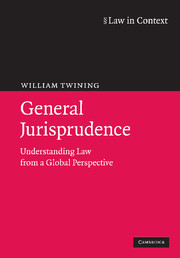Book contents
- Frontmatter
- Contents
- Preface
- Acknowledgements
- List of abbreviations
- Further abbreviations
- Part A
- 1 Jurisprudence, globalisation and the discipline of law: a new general jurisprudence
- 2 Analytical jurisprudence in a global context
- 3 Mapping law: Families, civilisations, cultures and traditions
- 4 Constructing conceptions of law: Beyond Hart, Tamanaha and Llewellyn
- 5 Normative jurisprudence, utilitarianism, and theories of justice
- 6 Human rights as moral, political and legal rights
- 7 Meeting the challenges to human rights: Griffin, Tasioulas and Sen
- 8 Empirical dimensions of law and justice
- Part B
- 14 Conclusion
- Bibliography
- Index
7 - Meeting the challenges to human rights: Griffin, Tasioulas and Sen
Published online by Cambridge University Press: 05 June 2012
- Frontmatter
- Contents
- Preface
- Acknowledgements
- List of abbreviations
- Further abbreviations
- Part A
- 1 Jurisprudence, globalisation and the discipline of law: a new general jurisprudence
- 2 Analytical jurisprudence in a global context
- 3 Mapping law: Families, civilisations, cultures and traditions
- 4 Constructing conceptions of law: Beyond Hart, Tamanaha and Llewellyn
- 5 Normative jurisprudence, utilitarianism, and theories of justice
- 6 Human rights as moral, political and legal rights
- 7 Meeting the challenges to human rights: Griffin, Tasioulas and Sen
- 8 Empirical dimensions of law and justice
- Part B
- 14 Conclusion
- Bibliography
- Index
Summary
Introduction: challenges and concessions
There are many kinds of human rights theories and a wide range of challenges to them. Rather than try to be comprehensive, I propose to consider three contemporary attempts to provide a coherent philosophical basis for human rights as moral rights from a global perspective. All three have been constructed with full awareness of the main challenges.
Supposing that we accept that it is meaningful to talk of some human rights as claim rights (such as a right to life or a right not to be tortured or a right to clean water) or liberty rights (such as freedom of expression and association), the question arises: what is the basis for believing that such rights exist? Furthermore, how can we distinguish between ‘real’ and ‘bogus’ human rights? To put this differently: What are the existence conditions for saying that a (particular) human right exists? This question is at the core of attempts to construct a philosophical justification for belief in human rights.
Still a common way to ground human rights is to base them on religion. Christianity grounded the great tradition of natural law, and latterly natural rights, in specifically Christian ideas about human nature and human rationality. For St Thomas Aquinas, natural law was that part of God's design for humanity that could be ascertained through the application of right reason to human nature.
- Type
- Chapter
- Information
- General JurisprudenceUnderstanding Law from a Global Perspective, pp. 202 - 224Publisher: Cambridge University PressPrint publication year: 2009

